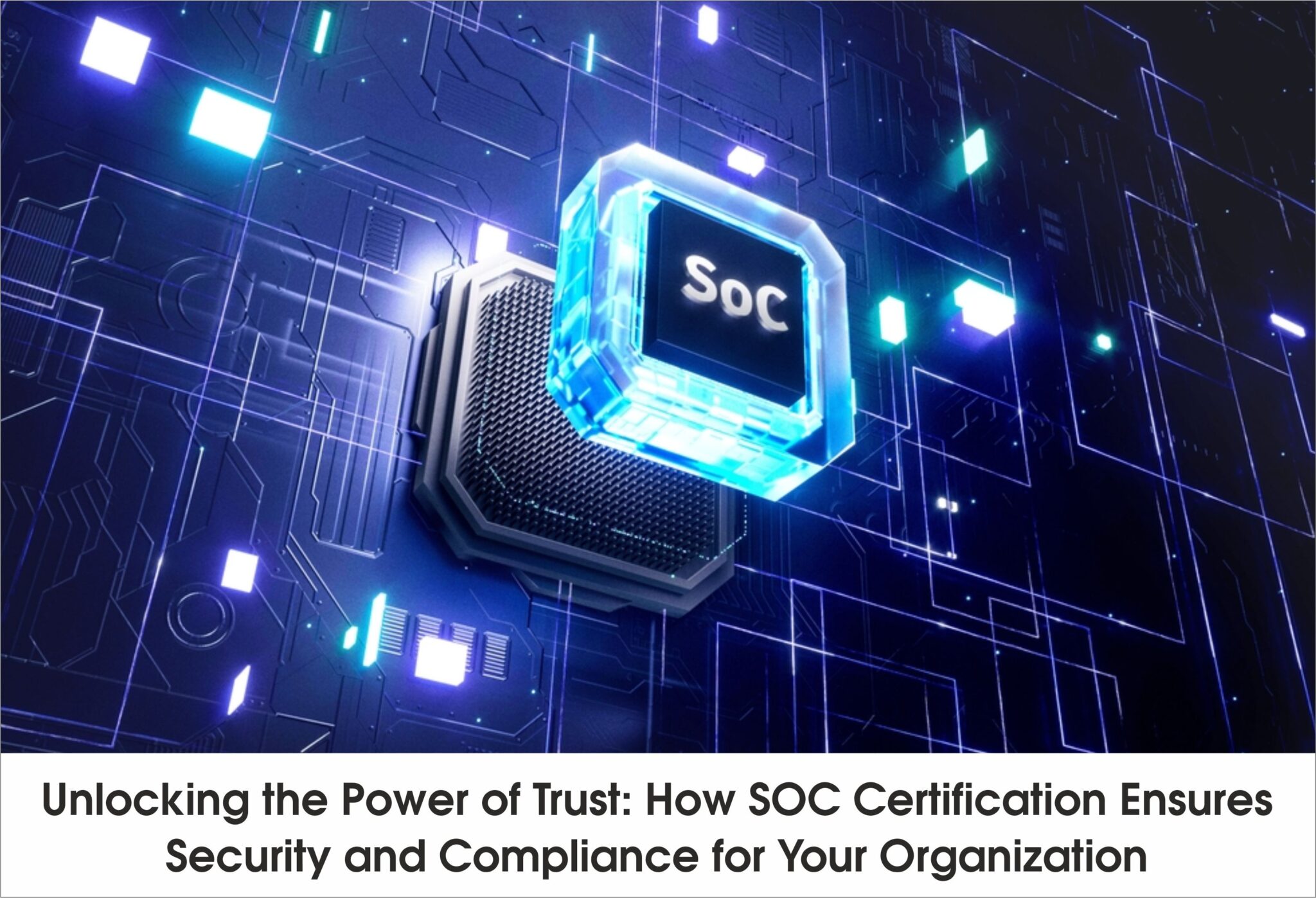Introduction: Understanding the Importance of Security and Compliance ⮯
In today’s digital landscape, security and compliance have become paramount for businesses of all sizes. With the increasing number of cyber threats and data breaches, organizations must prioritize the protection of sensitive information and maintain the trust of their customers.
One way to demonstrate a commitment to security and compliance is through obtaining a SOC (System and Organisation Controls) certification. SOC certifications provide an independent validation that an organization has implemented robust controls to safeguard data and ensure compliance with industry regulations.
The importance of security and compliance goes beyond just protecting sensitive data. It also plays a crucial role in building organizational trust. Customers, partners, and stakeholders are more likely to engage with businesses that can demonstrate their dedication to protecting their information.
Furthermore, adhering to security standards and regulations helps organizations avoid costly penalties and legal consequences associated with non-compliance. By implementing effective security measures, businesses can mitigate risks, prevent data breaches, and safeguard their reputation.
In this section, we will explore the significance of security and compliance in today’s business environment.
What is SOC Certification and Why is it Important?
SOC (System and Organization Controls) certification is a crucial aspect of ensuring the security and privacy of data for service organizations. It is a set of standards developed by the American Institute of Certified Public Accountants (AICPA) to evaluate the control systems and processes implemented by these organizations.
SOC certification provides independent verification that an organization has established effective internal controls and safeguards to protect client data. It assures clients that their sensitive information is handled securely and in compliance with industry best practices.
One common type of SOC certification is SOC 2 compliance, which focuses on security, availability, processing integrity, confidentiality, and privacy. A SOC 2 report outlines the controls in place to meet these criteria and assures clients about the organization’s commitment to safeguarding their data.
Obtaining a SOC certification demonstrates an organization’s dedication towards maintaining high standards of data security. It enhances trust between service providers and their clients, as it gives assurance that appropriate measures are in place to protect sensitive information from unauthorized access or misuse.
The Benefits of Achieving SOC Certification for Your Organization ⮯
There are many advantages to obtaining SOC (System and Organization Controls) accreditation for your business. Some of the main benefits are as follows:
- Enhanced Trust and Credibility: SOC certification is regarded as the gold standard for data security and proves to stakeholders, investors, and clients that your business takes data security seriously. It improves your reputation in the marketplace.
- Improved Data Security: A thorough assessment of your organization’s security, availability, processing integrity, confidentiality, and privacy measures is required to acquire a SOC certification. This aids in locating any gaps in your data security and offers recommendations on how to fill them.
- Reduced Risk of Data Breaches: A SOC certification can greatly lower the risk of data breaches by identifying and resolving flaws in your data security. This could protect your company from significant monetary losses and reputational harm.
- Compliance with Regulations: Organizations must adhere to specific data security standards in several industries. A SOC certification can be used to show compliance with these rules, possibly protecting you from penalties or other sanctions.
- Attracting New Business: Numerous companies, especially bigger ones, need certain certifications like SOC from their suppliers and service providers. Thus, having a SOC certification can lead to new business opportunities.
- Efficiency in Audits: Once you have a SOC report, you may share it with interested parties, auditors, or prospective customers, which eliminates the need for additional audits. This can help you save time and money.
- Transparency: A SOC accreditation offers insight into your organization’s data security rules and procedures. Client and stakeholder trust may increase as a result of this transparency.
Finally, even though obtaining SOC certification demands a time and resource commitment, the advantages it offers in terms of improved security, trust, and business potential make it a worthwhile endeavour for many businesses.
How Does the SOC Certification Process Work? ⮯
The SOC (System and Organization Controls) certification process is an essential step for organizations looking to demonstrate their commitment to data security and privacy. This certification assures clients and stakeholders that the organization has implemented effective controls to protect sensitive information.
The SOC audit process involves several key steps. First, the organization must identify which type of SOC report they need – either SOC 1, SOC 2, or SOC 3. Each report focuses on different aspects of controls and compliance. Once the type of report is determined, the organization must establish the criteria for SOC certification. This includes defining control objectives and identifying relevant control activities that will be assessed during the audit. These criteria are typically based on industry-specific standards such as ISO 27001 or NIST Cybersecurity Framework.
Preparing for a SOC audit involves conducting a thorough assessment of existing controls and identifying any gaps or areas for improvement. This may involve implementing additional security measures, documenting policies and procedures, and ensuring that all employees are aware of their roles in maintaining data security.
During the audit itself, an independent auditor will review the organization’s controls against the established criteria. This may involve interviews with key personnel, examination of documentation and evidence, and testing of systems and processes. Upon successful completion of the audit, the organization will receive a SOC report detailing its compliance with relevant control objectives. This report can then be shared with clients and stakeholders as evidence of their commitment to data security. Obtaining a SOC certification involves careful planning, implementation of robust controls, and undergoing a thorough audit process. It is an important step for organizations seeking to build trust with clients by demonstrating their commitment to protecting sensitive information.
The Role of SOC Certification in Building Customer Trust and Winning Business Opportunities
SOC accreditation is essential for gaining the trust of customers and landing lucrative business possibilities. Organizations that want to show that they are committed to data security and privacy must comply with the SOC (System and Organisation Controls) standard, which is a collection of rules and requirements. SOC accreditation allows businesses to demonstrate their capacity to safeguard confidential data and offer a secure environment for client data. This certification not only gives clients more confidence but also creates new opportunities for business growth.
The greater trust that SOC certification fosters among potential consumers is one of the major benefits it has for business development. Customers are becoming more watchful about the security procedures used by the businesses they choose to do business with since data breaches and cyberattacks are becoming all too typical in today’s digital age. Companies can reassure their clients that they have conducted thorough evaluations and have put strong security measures in place by gaining SOC accreditation. As a result, clients have more faith and confidence in the corporation’s ability to protect their data, which can be a big differentiator in the cutthroat business environment.
SOC certification is moreover a potent instrument for seizing new business prospects. SOC accreditation is a requirement for many firms, particularly those in highly regulated sectors like finance and healthcare. This certification shows that a business has complied with strict security requirements and can be trusted with sensitive data. Companies that hold SOC accreditation can position themselves as these organizations’ preferred partners, creating new opportunities for cooperation and economic expansion.
Gaining trust from customers and capturing company prospects require SOC certification. It gives prospective customers trust by making apparent the company’s commitment to data protection and privacy. SOC accreditation can also give a business a competitive edge by establishing it as a reliable partner for businesses that need high-security standards. Overall, gaining SOC certification is a calculated decision that can considerably aid in the expansion and growth of an organization.
Conclusion ✅
In conclusion, SOC certification is essential for building trust between service providers and their clients since it attests to the use of reliable control systems and procedures for safeguarding sensitive data.




